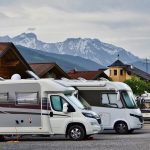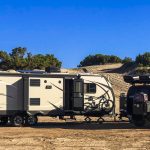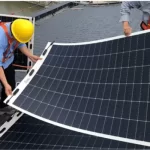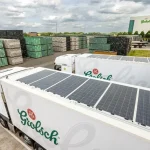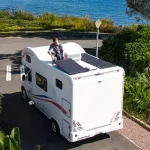“Motorhome travel and embracing the tranquility of nature go hand in hand. While some travelers prefer the convenience and Wi-Fi connectivity offered by traditional RV parks, others seek a more rustic experience through camping. Understanding the fundamentals of outdoor camping is highly advantageous for any RV enthusiast, as it provides an economical, convenient, and incomparable opportunity to enjoy the beauty of nature that might otherwise go unnoticed.”
“What is Boondocking?
Some avid RV owners refer to camping as dry camping or leisure camping. Others might call it independent camping or outdoor camping. In the world of RVs, boondocking means you’re not connected to water, sewer, or electricity. Wilderness camping is camping without access to electricity, water, or sewage facilities. This style of camping can be enjoyed in various ways, such as overnighting in commercial parking lots, camping on public lands, or even becoming a part of Harvest Hosts and Boondockers Welcome.
The most basic form of ‘drifting’ might involve what many call ‘wall hanging’ or spending the night at places like Walmart, Cracker Barrel, or other RV-friendly parking lots. Some businesses are better than others, but such stays are typically motivated by convenience, desperation, or lack of planning.
Camping in the wild is fantastic, but if you’re interested in camping closer to civilization and are looking for a better alternative than ‘wall hanging,’ then a Harvest Hosts membership might be right for you. You’ll gain access to a unique selection of RV camping options and enjoy unlimited overnight stays at wineries, golf courses, farms, and other attractions throughout North America. As a Harvest Hosts member, you’re sure to create lasting memories during your special stays at host locations. It’s a cost-effective style of camping that doesn’t require all the portable equipment. When camping off the grid, you’ll need to bring your own power, water, shelter, and other necessary portable gear.
High-capacity portable solar panels are lightweight and rugged, making them ideal for camping excursions. They’re compatible with Ecoflow portable energy storage, allowing you to charge your battery quickly without worrying about finding a power outlet. Here are two popular Sungold portable solar panels for wilderness adventures.”
What Are the Types of Boondocking?
Boondocking comes in several popular variations, including ‘wall docking,’ ‘mooch docking,’ ‘wilderness camping’ (boondocking), ‘lot docking,’ and ‘dry camping.’ While these terms are sometimes used interchangeably, they each have some distinctions. Let’s briefly explain them.
- Wall Docking: This is a common form of boondocking or dry camping where you can overnight in your RV, typically in parking lots like Walmart, without the need to set up a campsite or facilities.
- Mooch Docking: Also known as ‘driveway camping’ or ‘driveway surfing,’ this camping style allows you to camp for free on someone else’s private property. You can stay for a night or two on private land at no cost.
- Wilderness Camping (Boondocking): This is synonymous with ‘boondocking.’ You park your RV in remote locations, away from urban civilization. In this type of camping, you rely on your own power, water, and facilities.
- Lot Docking: When retail businesses allow RVs to overnight for free in their parking lots, it’s called ‘lot docking.’ Some popular retailers include Walmart, Home Depot, Pilot, and Lowe’s. Besides retailers, many casinos also offer free camping opportunities.
- Dry Camping: Camping in remote areas without external hookups, is often referred to as dry camping. In this scenario, you need to be self-sufficient for a period.
These various styles of boondocking cater to different preferences and levels of self-sufficiency, providing options for RV enthusiasts to enjoy the great outdoors on their terms.”
“What Is the Best Season for Camping?
The ideal season for motorhome camping largely depends on your preferences for climate and location. In general, the spring and autumn seasons offer pleasant temperatures and are considered the prime seasons for camping in various regions. Spring brings forth blooming landscapes, vibrant colors, and agreeable weather just before the scorching summer arrives. Meanwhile, autumn showcases magnificent fall foliage, cooler temperatures, and fewer crowds, providing a serene and laid-back camping experience.
However, it’s essential to research the specific destination you plan to visit and its weather patterns to make informed decisions. Keep in mind that extreme heat and cold can potentially limit camping opportunities unless you are well-equipped and prepared to handle such conditions.
Nevertheless, many RV enthusiasts opt for summer travel, employing strategic planning to deal with the sweltering heat. Additionally, winter offers unique moments of tranquility throughout the year, allowing you to forge deeper connections with nature and relish the serenity of the season.”
Boondocking In Your RV Basics and Key Points
When it comes to off-grid adventures, having the right essentials and mastering the necessary technical knowledge is crucial for ensuring a comfortable and successful off-grid experience. Let’s explore the fundamental elements required for outdoor adventures and the basic outdoor adventure skills that can enhance your adventure experience.
First and foremost, having the right essentials is paramount. These items include fresh water containers, reliable portable water filters, ample first aid supplies, camping chairs, durable camping stoves, and high-quality camping cookware. Additionally, investing in solar showers, portable toilets, and portable waste bins can provide added convenience and comfort during outdoor activities. However, if your RV is equipped with sufficiently large water tanks and waste disposal capabilities to last you about a week, you may not need to worry excessively about these aspects.
When considering basic off-grid camping, you should also think about items such as GPS devices or navigation apps to help you locate remote off-grid camping spots, reliable weather radios to stay informed about changing weather conditions, and cell phone signal boosters to improve communication in areas with weak signals. Furthermore, portable power stations or generators, as well as solar panel systems, can charge your devices and provide power for your RV’s appliances and electronic devices.
Whether you’re a beginner or an experienced off-grid adventurer, proper preparation and technical knowledge will ensure that you have an enjoyable and safe time in the great outdoors.
How Large of a Portable Solar Panel Do You Need for Off-Grid Charging?
When you’re out and about, you’ll need some basic energy-saving devices that consume less power and can be charged using portable solar panels. However, the exact size of the solar panel you’ll need for outdoor or camping activities will depend on the number of electronic devices you’re carrying and how long you plan to use them. For example, if you’re using a 100-watt fan for 6 hours, you’ll require 100W * 6H = 600Wh of power.
Sungold is a global leader in the field of portable solar panels, and you can use solar cables to connect your power station to the solar panel. When sunlight hits the surface of the photovoltaic panel, it converts into electrical energy and stores it in a battery or power station.
The chart below illustrates how Sungold portable solar panels are used for outdoor travel. For instance, to calculate the working time of a portable power station when charging a fan (100W):
Working Time = Capacity Wh * 0.85 / Device (Fan) Wattage = 1kWh * 0.85 / 100 = 8.5 hours.”
“How to Find the Best Boondocking Sites?
As outdoor camping and RV travel become more popular than ever, there are plenty of online resources available. Additionally, you can find many boondocking apps and websites, such as Campendium, the Allstays App, the US Public Lands App, and Harvest Hosts. While national parks typically do not permit boondocking, some parks, like Big Bend National Park in Texas, do accept boondocking reservations.
Is Boondocking Worth It?
Yes, boondocking provides you with a space to connect intimately with nature. It’s often quieter, allowing you to take a break from the fast-paced world of social media. Furthermore, it’s cost-effective or even free, making it a wise choice for those on a budget.”



